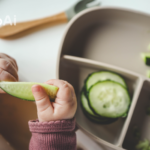Cubo Ai celebrates all mamas and caregivers who are involve with feeding their little ones. Breastfeeding is recommended by many health organizations for infants as it can help fight infections, lower their risk in later years for certain diseases, offer beneficial nutrition, and is convenient when it comes to time and cost.
For many, breastfeeding is intimate; creating a closer bond between mother and child. For others, that bond does not need to be formed through the act of breastfeeding.
No choice in how one feeds their baby should ever be regarded with shame or judgment. Read more to see other feeding options that mamas love!
Guide to this post:
Formula Feeding
Formula feeding is a quick and healthy option for many new mothers. In the United States, the FDA regulates all infant formulas sold to ensure they meet the nutritional and safety requirements.
These are just a few reasons why it’s a preferable choice for mamas:
- Confirmation on how much their child is eating
- Freedom to take medication or to drink wine
- Have more time for themselves, their family, or work
- Flexibility with workplace feeding
- Avoid the pressure to produce milk
Yet, for many low-income families formula is not plausible due to its high price. For women in countries with poor sanitation, where the water is unclean, formula becomes a danger to the baby’s life. However, the myths that such forms of nutrition can eliminate a bond with your child, lead to health risks, or are nutritionally inferior to breastmilk are not always accurate.

Pumping
Pumping can be the best of both worlds for new parents. Its convenience allows mamas to:
- Stock up on your milk supply
- Relieve breast pain or swelling
- Prepare food for your baby when you are not physically present (whether at work, out to dinner with friends, or attending an event).
For some people, exclusive pumping is the way to go and this is completely fine! For others, combo-feeding, breastfeeds + pumped milk/formula suits their comforts, commitments, and baby’s needs.
Donor milk
Donated milk, also known as milk banking, is when a mother donates extra milk she produced for someone else’s child to nourish. It is high in quality and comes with these benefits:
- Quality control on every bottle that is donated
- Milk is tested to ensure safety for a baby to ingest
- Essential, sometimes life-saving, nutrient for NICU patients
For mothers living in North America looking into donor milk as an option for feeding, connect with your local hospital or regional HMBANA bank. Countries around the world operate differently in distribution and promotion. But did you know, Brazil is particularly known for its well-distributed milk banking system? Kudos to them!
Remember: there is more than one way to feed your baby!
If donor milk is not available to you, look into the other options listed above and decide what is best for your situation.
Feeding is a Personal Decision
It might be overwhelming for new moms to consider all of the feeding choices they can make when it comes to their baby. But how you feed your baby is a personal and intimate decision that should be made by you, and people who know yours and the child’s medical history as well as your specific pregnancy journey.

Every Baby is Different
No one else should be included in this decision because every baby is different: needing diverse nutrients, attention, and care–so is every mother. The only thing that matters is that your baby is being taken care of the best way it can be.
Every Mother is Different
Nobody is the same and no one’s experience as a mother will be the same or needs to be the same.
At the end of the day, when it comes to a mother’s choice in feeding, that is hers to make. She knows herself, her body, and her baby better than anyone else.
Everyone Can Be an Ally

So while we celebrate World Breastfeeding Week, let’s talk ways to be an ally to mamas and caregivers:
- Recognize barriers women face when it comes to feeding
- Applaud women juggling motherhood against other responsibilities
- Stop portraying breastfeeding as the only healthy feeding option for a baby
Mom-shaming or parent-shaming does nothing to build an inclusive, educational, and better community. Further, let’s think more deeply about the mother’s mental and physical health.
A mother’s feeding choice should never come at the expense of their own well-being.
Because if a caregiver is not in a healthy state of mind, how can they truly give all of themselves to their child? Each mother knows her limits, what she can handle, and how she is feeling post-pregnancy. We need to listen to these women and allow them to advocate for themselves. As a parent, you need to take care of yourself just as much as you care for your family. So, to the moms out there, choose what is best for you and do not feel ashamed for being the mother you are.
About the writer

Meghan Nelligan is a freelance writer and creative storyteller based in the United States. She is passionate about mental health, creative writing, and social media. She also manages an Instagram account and a portfolio site for her poetry where she shares weekly readings, personal writings, and favorite works. Check it out here: https://gempoetry.squarespace.com/
You might also like:
- How to Track Your Baby’s Growth: Understanding Height and Weight Development

- Tiny Hands, Big Bites: A Complete Guide to Baby-Led Weaning (BLW)

- Essential Guide to Solid Foods for Baby’s Growth

- Soothe the Scratch! Easing Your Child’s Atopic Dermatitis

- Managing Your Child’s Fever: Simple Tips from a Pediatrician

- How Much Sleep Does Your Baby Actually Need?
